Key Elements That Define Good Customer Service Today

What defines good customer service today? Customers expect fast responses, personal attention, and seamless support across all channels. Businesses that deliver good customer service see powerful results. For example, 93% of customers return to companies offering excellent customer service, and 68% will pay more for brands known for good customer service (HubSpot). Expectations differ across industries, as shown below:
| Industry | Key Service Quality Expectations |
|---|---|
| Retail | Fast shipping, easy returns, personalized recommendations |
| Financial Services | Personalized advice, convenient online services |
With Sobot AI and Sobot call center, companies meet these demands. Readers can reflect on a recent customer service experience and consider the benefits of good customer service.
Good Customer Service Defined

What Is Good Customer Service?
Good customer service means supporting customers before and after a purchase to ensure a smooth and enjoyable customer experience. Leading organizations describe good customer service as more than just solving problems. It includes proactive and immediate support across multiple channels, such as phone, chat, and social media. Companies like Sobot help businesses deliver this level of service by offering omnichannel solutions and AI-powered tools that connect every touchpoint.
A positive customer experience often starts with fast, friendly, and knowledgeable help. For example, a customer who receives a quick answer through live chat or a helpful response on WhatsApp feels valued and understood. Good customer service also connects with other business functions, such as sales and marketing, to create a seamless journey.
Industry experts agree that balancing speed and quality is critical. Many organizations use tools like automation and omni-channel routing to help agents meet rising expectations. Training agents in both soft skills, such as empathy, and hard skills, like product knowledge, ensures that every interaction builds trust and loyalty.
| Metric Name | Definition / Purpose | How It Is Measured / Used |
|---|---|---|
| Customer Satisfaction Score (CSAT) | Measures how well customer expectations are met or exceeded. | Collected via customer surveys rating satisfaction on a scale (e.g., 1-5). |
| Customer Effort Score (CES) | Evaluates how easy it is for customers to resolve issues. | Surveys asking customers to rate ease of interaction after service engagement. |
| Net Promoter Score (NPS) | Measures customer loyalty and likelihood to recommend the business. | Single-question survey rating likelihood to recommend on a 0-10 scale. |
Key Qualities of Good Customer Service
The qualities of good customer service appear in every successful business. Personalization stands out as a top quality. Agents tailor communication to each customer, remember preferences, and use tools like Sobot’s unified workspace to enhance every interaction. Empowered employees can make decisions that benefit customers, which leads to faster solutions and greater satisfaction.
Other important qualities include teamwork, resilience, and consistency. Agents must adapt to different situations, listen actively, and communicate clearly. Empathy forms the foundation of good customer service, helping agents understand and share customer feelings. Companies that focus on these qualities see higher customer satisfaction and loyalty.
In 2024, trends such as AI integration, omnichannel support, and stronger self-service options shape the customer service landscape. Sobot’s solutions help businesses keep up with these trends, ensuring every customer receives a positive customer experience.
Core Elements of Customer Service
Empathy and Personalization
Empathy and personalization form the foundation of excellent customer service. When agents show empathy, they build trust and rapport with customers. Customers feel heard and understood, which leads to higher satisfaction and loyalty. Personalization means treating each customer as an individual, not just a number. This approach helps companies stand out in a crowded market.
Empathy is not just a soft skill. It drives real business results. Scientific research shows that when agents display empathy, customers experience a release of oxytocin, which fosters trust and cooperation. According to SQM Group, customer satisfaction rises by 35% when agents show genuine empathy. First Call Resolution (FCR) rates also improve, increasing customer satisfaction by 20%. Empathy reduces call escalations, shortens call durations, and lowers stress for both customers and agents.
Companies can train agents to develop empathy through active listening exercises and behavioral science-backed methods. Quality assurance scorecards, AI-powered sentiment analysis, and post-call surveys help measure empathy in customer service interactions.
Personalization goes hand in hand with empathy. Businesses use customer data to tailor interactions, remember preferences, and offer relevant solutions. Sobot’s unified workspace enables agents to access customer history and personalize every conversation. AI-powered chatbots from Sobot can greet customers by name, suggest products based on past purchases, and provide 24/7 support. These features make the customer experience seamless and memorable.
Here are some ways empathy and personalization impact customer service outcomes:
- Empathy builds trust and rapport, increasing satisfaction and loyalty.
- It helps diffuse difficult situations by acknowledging emotions.
- Empathy encourages forgiveness of mistakes.
- It improves employee morale by fostering a supportive culture.
- Empathy uncovers underlying issues through active listening.
- Personalized solutions reduce customer churn.
- Empathy and personalization drive more sales through positive word-of-mouth.
Personalized customer service also boosts retention rates. The table below shows how different aspects of personalization influence customer loyalty:
| Aspect | Description | Impact on Customer Retention |
|---|---|---|
| Customer Retention Rate | Percentage of customers who stay over time | Higher rates show personalized service builds long-term relationships |
| Repeat Purchase Rate | Percentage of customers making repeat purchases | Personalized service encourages repeat business |
| AI-Powered Communication | Use of AI tools to tailor interactions and respond promptly | Enhances experience by making service seamless and personalized |
| Loyalty Apps | Apps that reward repeat customers with discounts and exclusive offers | Encourage retention by making customers feel valued |
| Queue Management Software | Tools that reduce wait times and provide real-time updates | Improves satisfaction by minimizing frustration and personalizing visits |
| Personalized Communication | Targeted emails and messages based on behavior and preferences | Builds engagement and loyalty through relevant interactions |
Many leading brands, such as Apple and Amazon, use personalized communication, loyalty programs, and proactive support to keep customers engaged and returning. These strategies make customers feel valued and understood, which directly influences their decision to stay with a brand.
Effective Communication
Clear communication is a vital part of customer service. Agents must listen actively, speak clearly, and provide accurate information. When companies prioritize clear communication, customers feel confident and informed. This reduces confusion and builds trust.
Active listening helps agents understand customer needs and tailor their responses. Feedback loops allow companies to gather and act on customer input, leading to continuous improvement. Social media engagement provides a transparent and interactive way to connect with customers, building a sense of community.
The following strategies enhance customer satisfaction through effective communication:
- Establish feedback loops to identify pain points and improve service.
- Use active listening to understand customer needs with empathy and patience.
- Engage on social media for prompt and transparent communication.
- Handle complaints effectively by offering genuine apologies and making amends.
- Personalize communication based on customer data to foster loyalty.
Clear communication also reduces customer complaints and escalations. Companies that set clear expectations about policies and timelines prevent misunderstandings. Training agents and investing in better communication channels empower teams to resolve issues quickly. Proactive communication helps customers feel heard and valued, which lowers frustration and prevents problems from escalating.
- Implement customer feedback mechanisms, such as surveys, to identify service gaps.
- Set clear expectations about company policies and resolution timelines.
- Train agents to handle issues proactively and confidently.
- Use technology, like Sobot’s omnichannel platform, to monitor interactions and detect potential escalations early.
- Review customer interactions regularly to spot recurring problems and take action.
Sobot’s omnichannel solution supports clear communication by unifying all customer interactions in one workspace. Agents can respond to messages from chat, email, phone, and social media without switching platforms. This consistency ensures customers receive accurate and timely information, no matter how they reach out.
Responsiveness and Timeliness
Responsiveness is one of the most important elements of customer service. Customers expect fast answers and quick solutions. In 2024, 90% of consumers expect immediate responses, and 60% want a real-time reply within one minute. For chat or calls, 71% of customers expect real-time responses. Responsiveness matters more to 76% of consumers than any other factor. Companies that deliver faster service are 50% more likely to receive recommendations from customers.
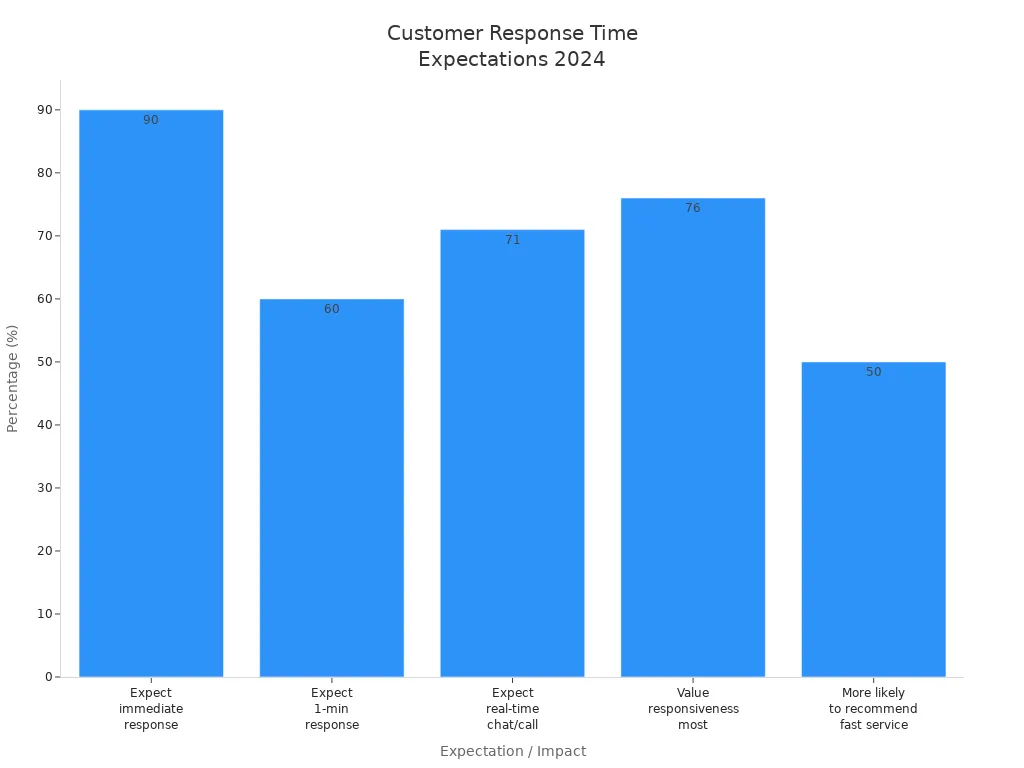
Delayed responses cause frustration and stress. Customers may feel ignored or undervalued, which damages their connection to the brand. Slow service leads to negative reviews, increased churn, and lost sales. Two-thirds of customers consider speed as important as price. Even minor delays can reduce loyalty and harm a company’s reputation.
- Delayed responses increase customer churn as customers switch to competitors.
- Negative word-of-mouth and poor online reviews arise from slow service.
- Operational costs rise due to extra workload on support teams.
- Financial performance suffers from lost sales and reduced loyalty.
- Rapid responses build trust, enhance brand perception, and foster long-term loyalty.
Sobot’s solutions help businesses meet these high expectations for responsiveness. The Sobot Cloud Call Center offers 99.99% uptime and global network support, ensuring customers can reach agents anytime. AI-powered voicebots and smart call routing reduce wait times and direct customers to the right agent quickly. The omnichannel platform allows agents to respond to inquiries from any channel in real time, improving both responsiveness and consistency.
Tip: Companies should monitor response times and set clear targets for their teams. Regular training and the use of advanced tools, like those from Sobot, help maintain high standards of responsiveness and customer service skills.
Consistency in responsiveness and communication builds trust over time. Customers know they can rely on the company for fast, accurate, and helpful support. This reliability strengthens the overall customer experience and encourages long-term loyalty.
Customer Support and Technology
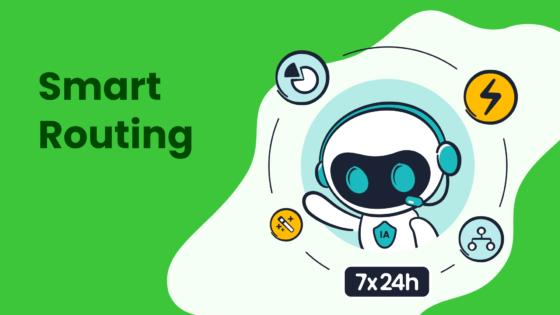
Omnichannel Solutions by Sobot
Modern customer service relies on seamless, integrated experiences. Sobot’s omnichannel solution brings together all communication channels—chat, email, phone, and social media—into one unified workspace. This approach allows agents to deliver consistent customer support, no matter how customers reach out. Companies using omnichannel strategies see higher customer satisfaction, faster response times, and improved loyalty.
A global software provider saw 88% of calls answered within 20 seconds and an 83% increase in first-call resolution after adopting an AI-driven omnichannel system. Sobot’s platform uses AI to automate routine queries, freeing agents to focus on complex customer service needs. Personalization improves as agents access cross-channel data, making every customer support interaction feel unique and valued.
Omnichannel solutions also reduce operational costs and speed up resolution times. Customers do not need to repeat information when switching channels, which makes customer service more efficient and less frustrating.
The table below shows how leading companies benefit from omnichannel customer support:
| Company/Industry | Omnichannel Solution | Key Improvements | Quantitative Impact |
|---|---|---|---|
| Zara (Retail) | AI-powered fitting rooms, mobile app, chatbots | Personalized experience, inventory optimization | 80% purchase rate after fitting room use; 15% sales rise |
| JPMorgan Chase (Banking) | Virtual assistants | Better engagement, higher conversion | 15% increase in conversion rates |
| Verizon (Telecom) | Predictive journey mapping | Reduced churn, higher NPS | Significant churn reduction |
Sobot’s clients, like Opay, have seen customer satisfaction rise from 60% to 90% and operational costs drop by 20%. These results highlight the power of omnichannel customer service.
Voice/Call Center Capabilities
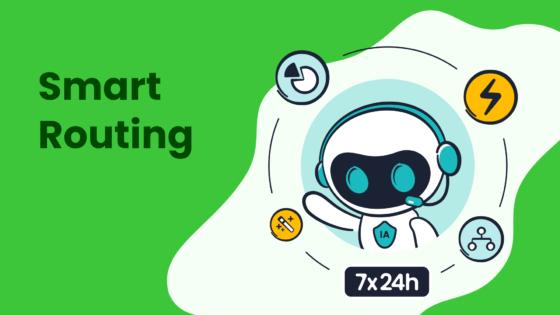
Voice and call center technology remains a core part of customer service. Sobot’s Cloud Call Center offers intelligent IVR, AI-powered voicebots, and smart call routing. These features help agents resolve customer support issues quickly and accurately. Advanced analytics and real-time monitoring allow managers to track performance and improve first-call resolution rates.
Companies using conversation analytics achieve a 76% first-call resolution rate, compared to 23% for those without. Sobot’s system ensures 99.99% uptime, so customers always receive reliable customer service. The platform supports global telephony, making it easy for businesses to provide customer support worldwide.
Agilent, a leader in life sciences, improved customer service efficiency sixfold after implementing Sobot’s omnichannel and voice solutions. The company reduced costs by 25% and achieved a 95% customer satisfaction score. These outcomes show how technology transforms customer support into a strategic advantage.
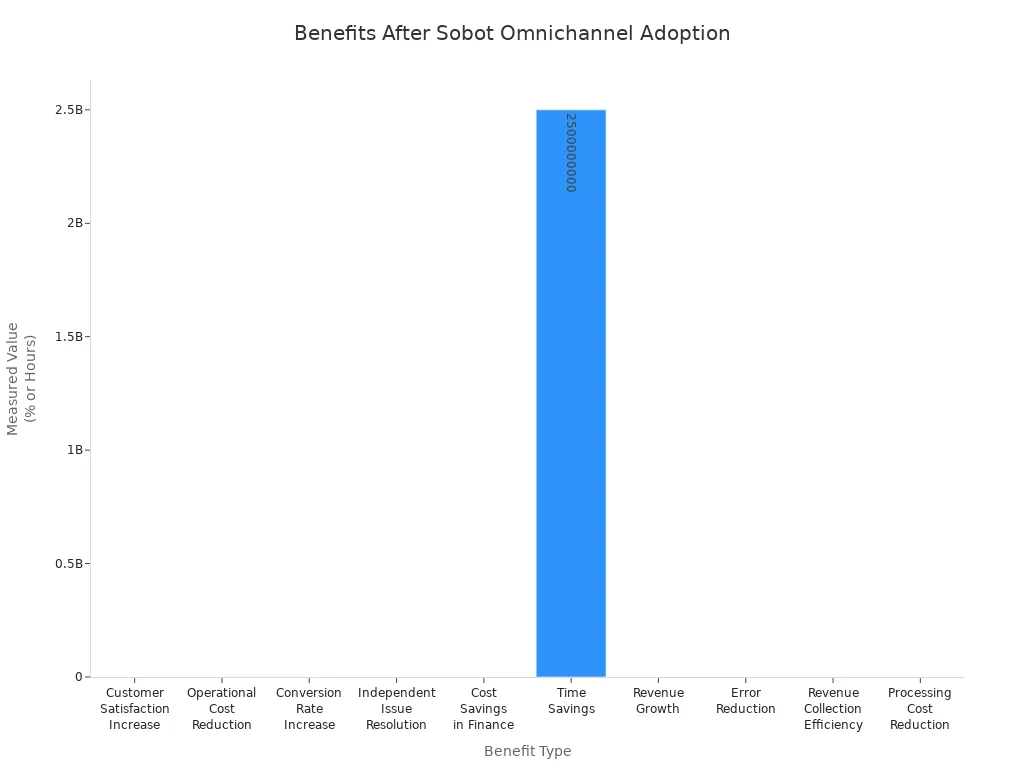
Sobot’s voice and omnichannel solutions help businesses deliver fast, accurate, and personalized customer service, driving loyalty and growth.
Benefits of Good Customer Service
Customer Loyalty and Satisfaction
The benefits of good customer service reach far beyond a single transaction. Companies that invest in excellent customer service see higher loyalty and greater customer satisfaction. When customers feel valued, they return and recommend the business to others. Trust, built through consistent and positive experiences, leads to 88% of customers becoming repeat buyers, according to Deloitte.
| Statistic Description | Percentage | Year | Source |
|---|---|---|---|
| Customers switching brands due to poor customer service | 45% | 2024 | SAP Emarsys |
| Customer-obsessed companies reporting better loyalty | 54% | N/A | SAP Emarsys |
| Customers who trust a store and return as repeat buyers | 88% | N/A | Deloitte |
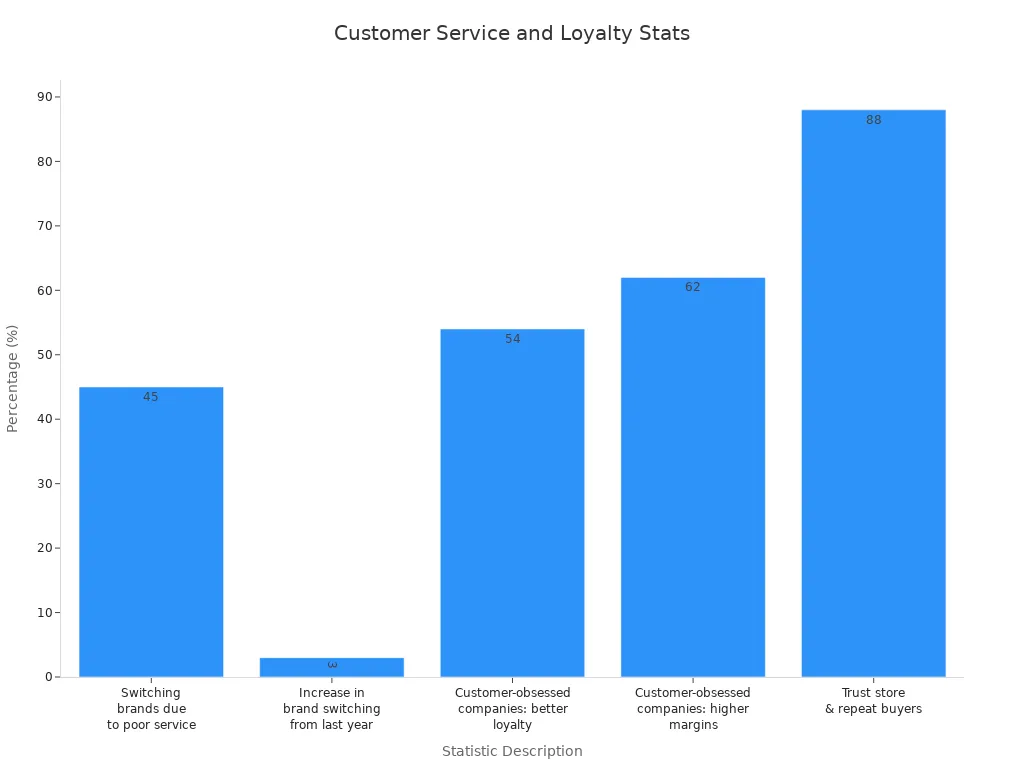
A positive shopping experience, especially with knowledgeable and courteous staff, drives both repeat business and referrals. Retailers aim for two-thirds of their customers to return and for two-thirds of new customers to come from referrals. High customer satisfaction makes this possible. Sobot’s omnichannel solutions help businesses deliver seamless support, which increases satisfaction and builds lasting relationships.
- Customer satisfaction increases the chance of repeat purchases and referrals.
- Positive relationships foster loyalty and dependable revenue.
- Companies with strong customer service see higher margins and better growth.
Operational Efficiency and Cost Savings
The benefits of good customer service also include improved operational efficiency and cost savings. Businesses that streamline their customer service processes resolve issues faster and use fewer resources. Sobot’s unified workspace and AI-powered tools help agents handle more inquiries with less effort, reducing wait times and improving first-contact resolution.
- Faster service delivery reduces resource use and streamlines operations.
- Omnichannel support and real-time monitoring boost productivity.
- Knowledge bases empower agents to solve problems quickly.
- Outsourcing and flexible staffing lower costs while maintaining quality.
Companies that focus on the benefits of good customer service see reduced operating expenses and higher profitability. Setting clear goals for metrics like CSAT and NPS, and acting on customer feedback, leads to continuous improvement. Sobot’s solutions enable businesses to monitor performance and adapt quickly, ensuring both customer satisfaction and operational success.
How to Improve Customer Service
Training and Empowerment
Companies that want to improve customer service must invest in both training and empowerment. Effective training programs build strong customer service skills, such as communication, empathy, and problem-solving skills. Leading organizations use a mix of ongoing learning, peer-to-peer knowledge sharing, and regular feedback to keep teams sharp. For example, workshops, e-learning modules, and performance reviews help employees stay updated on best practices. The table below highlights some of the most effective training programs and their unique benefits:
| Training Program | Focus Area / Unique Benefits |
|---|---|
| Dale Carnegie Training | Interpersonal communication, handling difficult situations, increased customer loyalty, problem-solving skills, enhanced communication techniques |
| Disney Institute | Creating magical customer experiences, anticipating customer needs, high employee engagement, exceptional customer satisfaction |
| Zappos Insights | Company culture, employee happiness, empowering staff, boosted morale, service autonomy |
| The Ritz-Carlton Leadership Center | Personalized customer service, memorable experiences, strong brand loyalty, industry-leading standards |
Empowering employees leads to better customer service outcomes. When staff have the authority to solve problems, they resolve issues faster and create positive experiences. Companies like Ritz-Carlton give employees the freedom to act, which builds trust and motivation. Empowered teams show more initiative, creativity, and ownership, which improves consistency and customer satisfaction.
Tip: Regularly collect customer feedback and use it to guide training and empower staff to make decisions that benefit customers.
Leveraging Sobot Solutions
Technology plays a key role in modern customer service. Sobot’s all-in-one platform helps businesses deliver fast, accurate, and personalized support. The platform integrates AI-driven chatbots, voice solutions, and a unified workspace, making it easier for agents to manage inquiries across channels. Companies like OPPO and Agilent have seen measurable improvements after adopting Sobot. For example, Agilent achieved a sixfold increase in efficiency and a 95% satisfaction score, while OPPO reached an 83% chatbot resolution rate.
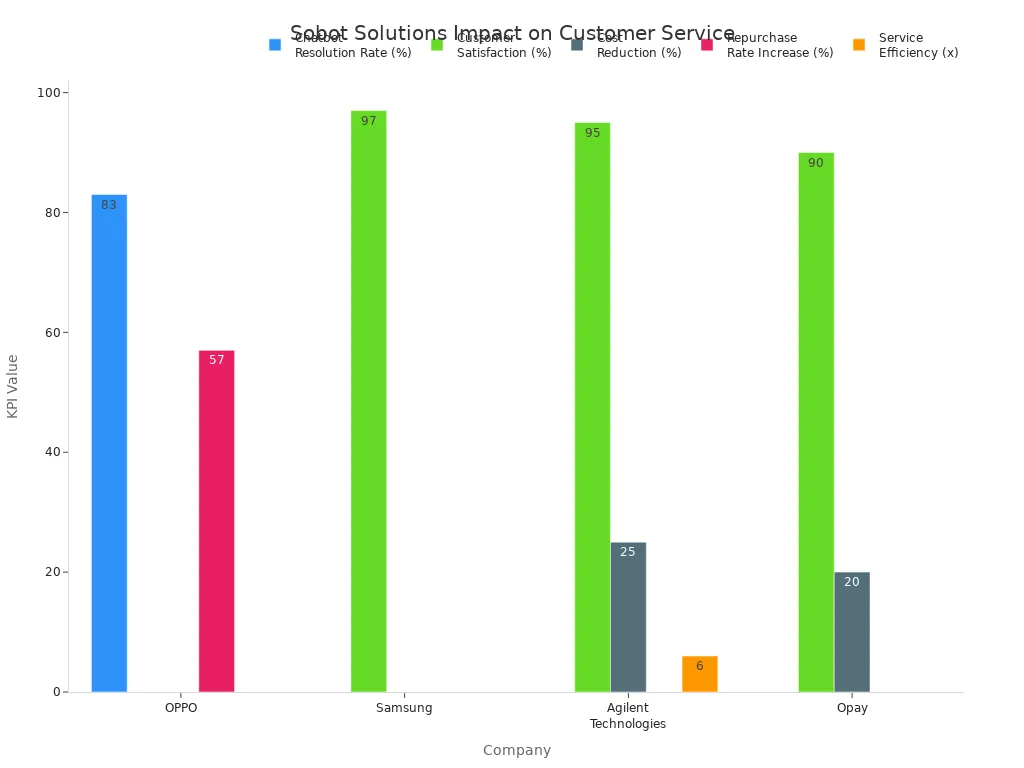
Sobot’s AI tools save time, boost productivity, and reduce operational costs by up to 30%. The platform supports multilingual support and real-time analytics, helping businesses respond quickly and maintain high standards. By adopting Sobot’s solutions, companies can overcome challenges like 24/7 availability, multichannel communication, and the need for consistency. These improvements lead to higher customer satisfaction, loyalty, and long-term business growth.
Customer service shapes business success through empathy, responsiveness, and clear communication. Companies that use modern solutions like Sobot see faster responses, higher satisfaction, and lower costs. Research shows 96% of customers value empathy, and AI-powered customer service can increase satisfaction by 25%. To improve customer service, businesses should:
- Empower teams with training and technology.
- Use omnichannel platforms for seamless support.
- Collect feedback and act on it.
- Personalize every customer service interaction.
- Respond quickly to every customer service inquiry.
- Maintain consistency in customer service delivery.
- Use AI to handle routine customer service tasks.
- Support agents with customer service data.
- Offer self-service options for customer service.
- Monitor customer service quality regularly.
Share your customer service stories or contact Sobot for more information.
FAQ
What makes customer service effective in 2024?
Effective customer service in 2024 uses technology, empathy, and fast response times. Companies like Sobot help businesses unify channels and automate routine tasks. According to Salesforce, 88% of customers say good service makes them more likely to buy again.
How does Sobot improve customer service for global businesses?
Sobot provides omnichannel solutions and a cloud call center with 99.99% uptime. These tools help agents manage customer service across chat, phone, and social media. Businesses can support customers worldwide and maintain high satisfaction scores.
Why is customer service important for business growth?
Customer service builds trust and loyalty. Research from HubSpot shows 93% of customers return to companies with excellent service. Satisfied customers recommend brands, which leads to more sales and long-term growth.
Can AI-powered tools replace human agents in customer service?
AI-powered tools handle routine questions and provide 24/7 support. Human agents still play a key role in complex or emotional situations. Sobot’s AI chatbots work alongside agents, improving efficiency and customer service quality.
See Also
Effective Strategies To Improve Customer Satisfaction In Live Chat
How To Select The Best Social Media Support Software
Comprehensive Overview Of Quality Management Systems In Call Centers
Proven Best Practices For Managing Call Center Quality Effectively
Leading Customer Service Software Solutions To Watch In 2024
